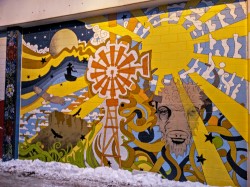Editorial | February 15th, 2017

They met in Minneapolis, at the bus station. They were both from Ghana, and both had been refused asylum in the U.S. They decided to go to Canada, and took a bus to Grand Forks.
Razak Iyal, 35, says only that he had political and other problems. Seidu Mohammed, 24, was afraid to go back to his native country. It’s dangerous to be gay in Ghana.
The criminal code of Ghana has no clear-cut definition of homosexuality. A prosecuting attorney will use a portion that talks about “unnatural sex,” which is sex with an animal. Under Ghanaian law, Seidu Mohammed would be criminally liable for consensual sex “in an unnatural manner.”
In Grand Forks, a cab driver told them that they would be deported at the Canadian border post. The driver offered to take them to a place that was better for crossing illegally, but farther from the border.
The taxi driver was talking about a 2004 agreement between the U.S. and Canada, called Safe Third Country — refugees have to ask for protection in the first safe country they set foot in. Refugees at a Canadian border post are rejected and told to apply in the U.S.
What makes a good place to cross the border in the winter? The ideal would be two towns, one right next to the other, on either side of the border. And then it should be accessible from the nearest big city, Minneapolis-St. Paul; and it shouldn’t be too hard to get to Winnipeg, where there are helping professionals and facilities to receive refugees, and government agencies where they can present their cases.
In this part of the Midwest, it has to be Noyes, Minnesota and Emerson, Manitoba. The taxi driver in Grand Forks charged Seidu and Razak $400, $200 each for a 160 mile round trip.
He left them on the I-29, 146 miles from Grand Forks, just short of the off-ramp to Pembina County Road 55, the last place before the border where he could turn around and head back to Grand Forks. That’s a little over two miles from the border, maybe two and a quarter. He pointed across the fields at some distant flashing red lights and told them that was the way to Canada. The lights were on wind turbines near the town of Letellier, Manitoba.
We are not saying the taxi driver broke any laws. All we can say is, that was a deadly piece of wrong advice.
All the taxi driver had to do was take them to Noyes, Minnesota, seven miles by road, fourteen miles round trip. His actions show that he was thinking only of the minimum he could do for his $400. Surely he could see that they weren’t dressed for the weather. He pointed them across the fields to get rid of them.
Seidu and Razak say that they walked through deep snow, knee deep to waist deep in the worst parts. The temperature was one below zero with a stiff wind blowing, and
The wind chill temperature was far below that. Seidu’s hat was blown off and he lost his gloves.
Their plan was to call 911 when they reached a Canadian highway. They waded through the snow for about three miles, probably until they reached Manitoba Provincial Road 243, turned right and found Manitoba Highway 75. By that time, several newspapers observed, their hands were claws. They couldn’t get their phones out of their pockets, and couldn’t hold onto them if they did.
They walked along Highway 75, trying to flag down passing vehicles. The traffic on Christmas Eve was almost all trucks. Some of them said hello with their high beams, but no one stopped and no one called 911. They walked along that highway for about seven hours.
Finally, one truck driver, who wishes to remain anonymous, stopped and helped. He called 911 for them. By that time they were just north of Letellier, about 13 miles away from where the taxi driver had left them.
Seidu and Razak are in a hospital in Winnipeg now. All of Seidu’s fingers and one of his toes were amputated. Razak still has one thumb and half of the other one.
We’re talking to you, Grand Forks taxi driver. If you feel no remorse, you’re a bad person -- not, perhaps, actively malignant, but uncaring and irresponsible like so many others.
And to you, anonymous truck driver: thank you for saving their lives.
And we, Minnesotans, North Dakotans, and Manitobans, are a major island of sanity, the front line against the apparent coming barbarism. We can do better than this.
Far away and in much better weather, Rana Sweis and Dan Bilefsky of the New York Times spoke with a married couple at Amman Airport, in Jordan, on February 6.
Hasan Alwan and Sanieh Azzawi from Baghdad had waited two years to travel to their final destination, North Dakota.
“I am excited,” Ms. Azzawi said. “We have been waiting for this day, and we were so afraid it would not happen,” she said, referring to the travel ban. “People who I know in the U.S. told me, ‘In America you follow the rules and everything will be all right.’”
Welcome to North Dakota, Sanieh! We assure you that almost all of us do follow the rules, with the exception of the executive branch of the federal government.
February 16th 2026
January 15th 2026
December 18th 2025
November 18th 2025
October 15th 2025
_(1)__293px-wide.png)
__293px-wide.png)


_(1)__293px-wide.jpg)
